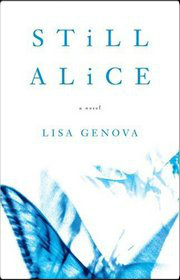
Review Vicky T. (VickyJo)
The fact that I recommend books to people inspires some folks to recommend books right back at me. I love this, actually, because as I’ve mentioned before, I can’t possibly live long enough to read everything that I would like to…so recommendations are always helpful.
Not too long ago, I had a friend come into the library and return the book “Still Alice” by Lisa Genova. My friend said, “You have GOT to read this one.” “Oh, thanks…I will!” I promised…and then I took a closer look at the book. This is a novel about Alice Howland, a highly respected professor of psychology at Harvard who, just before her 50th birthday, is diagnosed with Early Onset Alzheimer’s Disease. Ugh. How depressing is that? First of all, I’m just over 60. I forget things all the time. I really don’t need to read this. So I very unobtrusively slipped it back on the shelf.
Of course, a few weeks later, this same friend asked me if I’d read “Still Alice” yet. I really can’t lie well at all, and so I confessed that, no, I hadn’t. “It sounds too depressing.” “It’s NOT,” she insisted. “Try it.” So okay, I took the book home. It might not be that bad. And maybe I’ll pick up some tips on Early Onset Alzheimer’s for my own personal use, you know?
Well, you guessed it: I loved this book. The author is actually a neuroscientist at Harvard, so she not only knows what she’s talking about, but she explains the progression of this disease very clearly and concisely. At the same time, she doesn’t turn the novel into a lecture. Rather, she examines the causes and effects of EOAD, how it impacts not only the patients, but their families as well. She does a remarkable job of showing us Alzheimer’s from the inside…from the patient’s point of view.
Alice begins forgetting things; she searches for words, for her Blackberry, for her car keys. But when she becomes totally disoriented while out jogging one day, she knows this is more than being too busy, or just distracted, or the onset of menopause. Her doctor confirms the seriousness of her forgetfulness. The book spans three years, from September 2002 to September 2005. During this time, this disease robs Alice of so many things. She tries to hide it, but eventually she announces that she has Alzheimer’s and resigns her job. She must stop teaching, stop mentoring students; she cannot jog alone anymore, let alone travel to conferences all over the world the way she used to. She watches her husband grieve for her, even though she’s still right there. She sees the fear in her grown children as they wonder about the genetics of EOAD, and if they too will be afflicted. She creates a test for herself to take every so often. She composes five questions, such as “What is your address?” and “When is your daughter’s birthday?” At the end of the test, she instructs her future self, “If you can’t answer these questions, go to the bedside table. There is a bottle of pills there. Take all of them.” Alice can’t imagine having her family deal with her as the disease progresses, and so she decides suicide might be the best way to handle her illness, and spare her family. But, due to the nature of this heartbreaking disease, even this little safeguard won’t work. Alice eventually forgets to take the test.
If you have a loved one that has Alzheimer’s, I strongly recommend you read this book. I watched my grandmother go through this about 20 years ago, and I wish I could have read it back then. It’s not depressing, which surprised me, but it does have incredibly touching moments. I’m so glad I took a chance on “Still Alice.” And it also made me feel a bit better about not remembering where I put my car keys; the author explains ordinary forgetfulness as opposed to Alzheimer’s, and I’m happy to say, I’m doing okay.








